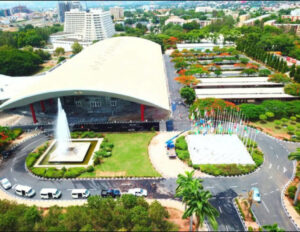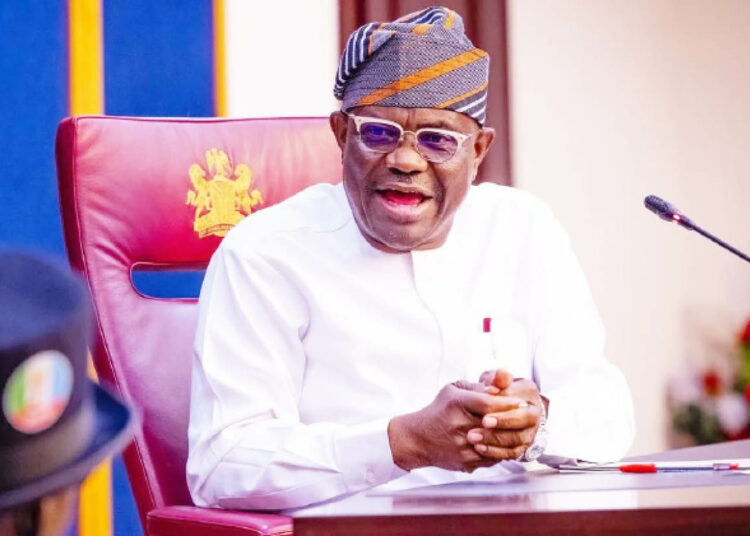On June 10, 2025, President Bola Tinubu presided over the inauguration of the newly refurbished Abuja International Conference Centre (AICC), renamed Bola Ahmed Tinubu International Conference Centre in his honour.
This landmark event heralded the commencement of an ambitious 17-day commissioning spree across the Federal Capital Territory (FCT), a bold showcase of infrastructural advancement under the stewardship of the FCT Minister, Nyesom Wike.
The president described the refurbished facility as a symbol of Nigeria’s renewed commitment to excellence. Standing before a crowd of dignitaries and media representatives, Tinubu praised the transformation of the centre, recalling his previous experience of it as “dirty, disorganised, and uninhabitable.
“Today, we celebrate not just this centelte, but the determination and character of the Nigerian spirit. “This facility now reflects that Nigeria is the Giant of Africa.
“Today, we are reaping the rewards of hard work and investments made under our Renewed Hope Agenda.”
He emphasised the administration’s vision to revitalise infrastructure spanning transportation, healthcare, education, energy, and urban development.
Wike took the opportunity to thank the president for his invaluable support and praise the construction giant, Julius Berger, for its attention to details and commitment to quality.
The renovated AICC, which cost an estimated N39 billion, is now adorned with cutting-edge acoustics, lighting and HVAC systems.
While some critics argue that the budget could have built a new complex, Wike defended the expenditure, attributing it to inflation and the necessity of utilising high-quality imported materials.
“To ensure sustainability, we have Julius Berger overseeing maintenance, preventing the past pitfalls of mismanagement,” Wike explained.
Residents of the FCT are cautiously optimistic about this new direction. “I remember how embarrassing the AICC was. Seeing it transformed gives me hope that we can have world-class facilities in Abuja. It is long overdue,” said a photographer, Bala Ibrahim.
The commencement of this ambitious programme marks a significant chapter in Wike’s administrative philosophy, which prioritises rapid infrastructural development across Abuja.
With a strong track record as “Mr. Project” from his tenure as governor in Rivers State, where he delivered 27 projects in just two years, Wike aims to replicate his successful blueprint in the capital city.
At the heart of his agenda are comprehensive road networks designed to improve urban mobility and economic integration.
One highlight is the Gishiri Interchange, which connects affluent areas like Jahi, Maitama and Mabushi, solving a notorious traffic problem.
The Kwali-Pai-Gomani Road, a 30.4 km project, promises to revolutionise travel for farmers, slashing travel times from hours to just 20 minutes, facilitating their access to urban markets.

“The construction of the Kwali-Pai-Gomani Road is a game changer for us. We can now sell our products fresh and directly to the market. The minister has done what no other minister thought of doing for us in Kwali since the existence of the council,” said Aminu Ali, a farmer who operates on the outskirts of the capital.
Despite the ambitious pace of development, Wike’s approach faces scrutiny regarding its inclusivity and long-term sustainability.
“It is great that roads are being built, but what about education and healthcare? This feels like all optics and no substance,” queried Yusuf Kamara, a community advocate.
Using a substantial portion of the 2025 budget, which allocates 72.3 percent of the N1.78 trillion total to capital projects, Wike aims to weave together the infrastructural fabric of the city.
His efforts extend to rural integration as well, with projects targeting neglected satellite towns, such as the Ushafa-Army War College Road in Bwari area council and revitalised Gwagwalada township roads.
Alongside road construction, Wike has also prioritised public transportation reforms amid rising safety concerns.
The completion of two new bus terminals in Mabushi and Kugbo aims to tackle the infamous “one-chance” robbery menace plaguing commuters.
“This should make public transport safer and more organised. But we still need to see how this all functions in reality. Because many of us road users have suffered so much in the hands of notorious one chance criminals,” said Ms. Comfort Okechukwu, a resident of Dutse Alhaji.
Despite his commitment to reform, Wike’s governance style is not without controversies.
His “no-nonsense” approach, evident through the demolition of illegal structures in Abuja, has attracted mixed reactions, with critics arguing that it could exacerbate housing insecurity for vulnerable populations.
Moreover, Wike has executed a rigorous debt recovery initiative, reclaiming long-standing ground rents, signaling a commitment to fiscal responsibility.
However, this aspect of his governance has also triggered political apprehension, with detractors accusing him of leveraging Abuja’s resources for political patronage.
“Wike is a strong man politically and does not shy away from conflicts. But his motives could easily be misinterpreted as self-serving, especially among rivals,” Dapo Isaac, a political analyst said.
Also, during the commissioning of the Arterial Road N16 (Shehu Shagari Way) in Katampe District, President Tinubu hinted that Wike, a member of the opposition Peoples Democratic Party (PDP), would be welcomed into the ruling All Progressives Congress (APC) should he choose to defect.
“He is not a member of my party, not yet. But if he changes his mind and registers with the progressives, we will welcome him,” Tinubu said, suggesting a deeper shift in political dynamics.
Wike’s commitment to reform extends to ensuring the AICC operates sustainably, instituting a fee policy requiring ministries and private users to pay for accessing the conference center.
“No more ‘my brother wants to wed here for free. If you want this beautiful place, you must pay. This is how we sustain excellence,” he said.
Yet, questions remain about whether this newfound financial model will truly reflect community needs.
“If prices go up too much, it will become exclusive. We cannot shut out local people when Abuja has so much potential,” cautioned Ngozi Uche, a frequent visitor to the AICC for community events.
Despite valid criticisms, the Wike administration is keen on establishing a legacy of visible successes.





